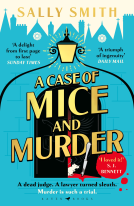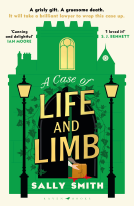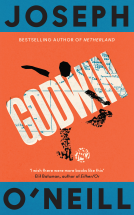
Afterlife Crisis
by Randal Graham
This title was previously available on NetGalley and is now archived.
Send NetGalley books directly to your Kindle or Kindle app
1
To read on a Kindle or Kindle app, please add kindle@netgalley.com as an approved email address to receive files in your Amazon account. Click here for step-by-step instructions.
2
Also find your Kindle email address within your Amazon account, and enter it here.
Pub Date 8 Sep 2020 | Archive Date 14 Oct 2020
Talking about this book? Use #AfterlifeCrisis #NetGalley. More hashtag tips!
Description
Where do you go after you die? Detroit.
“Finally, a hitchhiker's guide to the hereafter.” — Corey Redekop, author of Husk
Something’s rotten in the afterlife. At least that’s how it seems to Rhinnick Feynman, the one man who perceives that someone in the afterlife is tugging at history’s threads and retroactively unraveling the past. Doing his best to navigate a netherworld in which history won’t stop changing for the worse, Rhinnick sets off on a quest to put things right.
This would be a good deal easier if Rhinnick didn’t believe he was a character in a novel and that the Author was changing the past through editorial revision. And it’d be better if Rhinnick didn’t find himself facing off against Isaac Newton, Jack the Ripper, Ancient Egyptians, a pack of frenzied Napoleons, and the prophet Norm Stradamus. Come to think of it, it’d be nice if Rhinnick could manage to steer clear of the afterlife’s mental health establishment and a bevy of unexpected fiancées.
Undeterred by these terrors, Rhinnick recognizes himself as The Man the Hour Produced, and the only one equipped to outwit the forces of science and mental health.
Available Editions
| EDITION | Other Format |
| ISBN | 9781770414709 |
| PRICE | US$17.95 (USD) |
Featured Reviews
 Dave M, Reviewer
Dave M, Reviewer
For those who are fans of The Hitchhiker's Guide to the Galaxy know that the tale was originally presented on the radio and the flowing nonsensical nature of that story is echoed here, with this story seeming to be more raw and stream of consciousness. The cleverness of the writing is fun and the wit is definitely dry.
 Annie S, Librarian
Annie S, Librarian
There is a developing genre called the New Weird, marked by strange civilizations, hallucinatory writing, and a general feeling of “what the hell did I just read?” Randal Graham’s Afterlife Crisis is weird, even if it’s not New Weird. I don’t have a genre label for the kinds of fiction that Graham, Tom Holt, and a scant handful of others write. Graham’s novel, like others in this as yet unnamed genre, is marked by hilariously erudite verbosity; references to literature, myth, science, art, history, psychology, and all the rest of the library; and a determined willingness to play with the laws of reality. I adore these novels. Their loopy wordiness is a pure delight for my bookish soul.
Afterlife Crisis is the sequel to Beforelife, which I have not read. Given how forgetfulness is a running them in Afterlife Crisis and its general weirdness, I wouldn’t say that reading Beforelife is an absolute necessity. I was able to get along just fine. That said, I want more of Graham’s bizarre version of the afterlife and definitely plan to read Beforelife.
Afterlife Crisis follows the adventures of Rhinnick Feynman as he gets wrapped up in other people’s adventures to change Detroit, an afterlife full of people who think that the beforelife is a mental illness and where teleportation is possible. At least, it was possible. Rhinnick Feynman is part way through his search for Isaac Newton at the behest of Abe, the god of Detroit—see what I mean about weirdness?—when the teleportation system suddenly disappears and he has to take a bus to the university. This is probably the most comprehensible part of the plot. It just gets goofier from there.
Rhinnick’s internal monologue made it easy to be a passenger in Detroit. He talks like a post-corporeal Bertie Wooster and I couldn’t get enough of it. Graham’s writing is pitch-perfect Wodehouse. Even though the story twisted and turned all over the place, I was often laughing at Rhinnick’s phrasing. I also loved his (after)world view. Rhinnick firmly believes that the reality all the characters find themselves in is a story written by a great Author who occasionally revises as they go. This belief gives Rhinnick a very laissez-faire attitude to things, which also helped the oddities go down more easily.
I really enjoyed this book. I strongly recommend it for readers who also love the gentler side of Weird, especially when it comes with a couple of thesauri worth of words.
Readers who liked this book also liked:
Rick Riordan; Mark Oshiro
Children's Fiction, LGBTQIA, Teens & YA
Keith Martin; Konstantinos Mersinas; Guido Schmitz; Jassim Happa
Business, Leadership, Finance, Computers & Technology, Reference


















